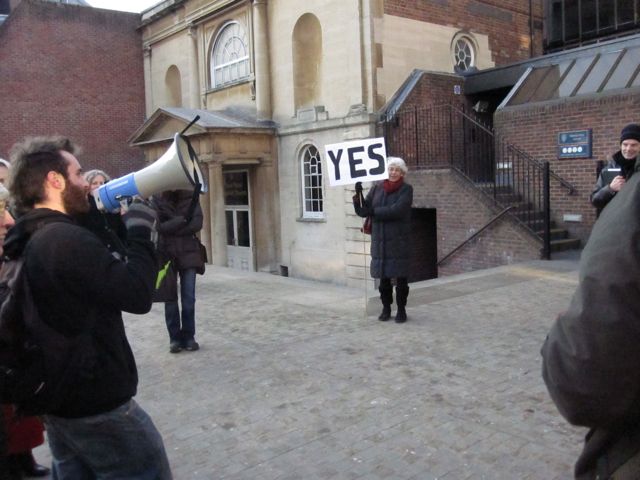
Progressive organizations, from trade unions to large nonprofits, have long struggled to find ways of aligning their values with their work. In these organizations, "management" is often uttered with an air of disgust, seen—correctly—as the source of many of the injustices the staff works to fight. Yet, in spite of this, our organizations have tended to adopt the same management systems found in business and government, blind to the ways we perpetuate some of the very things we criticize in other institutions.
Ultimately, if we want to create a world of democracy, transparency, and egalitarianism, we need to start to demonstrate what that looks like in our own work. How do we make decisions? Who does what jobs, and why? How do we treat each other?
If we can't manifest our values in our own offices, it seems unlikely that we can do so in our communities, cities, or countries. Yet many social change organizations continue to churn out formulaic reiterations of the organizing systems constructed by Anglo-American industrialists a century and a half ago. At their core is the idea that a few great leaders will create hierarchies led by specialists and experts, and that the rest of us will be given a box (or cubicle) to fit within, to implement the visions of the infallible heroes at the top.
Some organizations have concluded that workplace dictatorships are simply a necessary evil on the road to a better world. Luckily, though, there have always been those less inclined to believe in the old fallacy of "the ends justify the means," which assumes that any steps towards a positive result are acceptable, even if they would be seen as unethical in any other context. Instead, some have chosen to explore what it might look like to do socially useful things in groups without undermining their core values in the process.
My new book, "Anarchists in the Boardroom", tells the stories of Argentine worker-run factories, Occupy encampments, and direct actions against tax-dodging corporations to highlight some of the emerging alternatives to our inherited systems of organizing. There is something deeply human about these non-hierarchical systems that seems to bring out the best in us. They allow us to find our own ways of supporting the causes we believe in, rather than slotting us into hierarchies and departments that prescribe how we are meant to do so. Below are a few key lessons that could help our organizations to embrace the humanity of the people that make them up:
1.Participatory consensus-based decision making builds trust
While there were far more differences than similarities among the nearly one thousand Occupy camps that emerged around in the world in late 2011, consensus-based decision-making was one of the movement's hallmarks.
This was no coincidence. Drawing on previous movements from Spain and Latin America, Occupiers knew that decisions made by a small part of a big group tend to lack the collective investment needed to turn those decisions into widespread action. Alternatively, when it comes to big-picture questions, decisions made by as-close-to-everybody-as-possible tend to create meaningful buy-in for whatever decisions emerge (even if this is initially a time-consuming process).
This is a fundamental difference between representative democracy and the participatory kind, which treats decision-making as constructive compromise rather than a fight to win by "50 percent plus one." Fundamentally, consensus-based decisions build trust among those involved, encouraging them to find their own autonomous ways of taking those decisions forward. The value of this trust-building shouldn't be underestimated.
2.When we trust each other, we organize better
Without trust, even the best systems fall apart. There's a structural level to any form of democracy, but there's also a personal one. If we aren't working to build trusting relationships between colleagues, members, supporters, and others within and around our organizations, we will struggle to make those organizations the places we want them to be.
Trust helps us move beyond the formal structures of democratic process to the spirit of it, in which mutual accountability informs each of our individual actions without the need for an extensive decision-making process every time. In social movements the need to be trustworthy is amplified because the personal risks involved are often higher than in most formal organizations. Luckily, in most situations people respond to being trusted by becoming more trustworthy. Mutual trust breeds mutual accountability, which tends to push most of us to do better at the things we care about.
Formalized roles and hierarchies undermine trust by giving some individuals power over others, which is one of the fundamental reasons so many movements have avoided these structures. Instead, social movements (at their best) allow people to work together more fluidly, slipping between roles and following their individual passion to work where they are inspired to, rather than where someone else has told them to. A growing body of evidence suggests that people in all fields achieve far more when they have a strong sense of autonomy over what they do, as opposed to when they are told what to do and how to do it.
3.We can't predict what the world will look like tomorrow, so focus on the moment.
In the range of examples I explore in my book, there is a noticeable absence of planning meetings or strategy retreats. When I met with the activists who helped kick-start Occupy Sandy—the self-organized disaster response effort that emerged after Hurricane Sandy hit—they told me that they didn't spend time "sitting in a room strategizing together," but instead got out and did what was needed.
This ad hoc responsiveness is often the norm in movements. It demonstrates the notion that the specifics of a movement's direction can't and shouldn't be determined before experiencing the on-the-ground realities. That responsiveness was more important than anything that could be conceived in a boardroom or conference center, months or years in advance.
The primary lesson I've found in bringing learning from grassroots social movements to organizations, is that organizational change, as with social change, is most effective when it comes from the grassroots. As in society more widely, if those of us lacking executive powers decide to wait for those in charge to bring us participatory democracy, we'll be waiting a long time.
Sometimes this is because of fundamentally different values often held by those who succeed in climbing institutional ladders. But more often it is simply the inability of a small group to know the right direction for a much larger one.
More involvement means more perspective. More perspective means better odds of finding solutions and ways of doing things we've traditionally missed. Thus, participatory democracy is better for achieving our social aims, and is within the reach of us all.
So it's over to you. How will you start your workplace revolution?
3 WAYS TO SHOW YOUR SUPPORT
- Log in to post comments

















